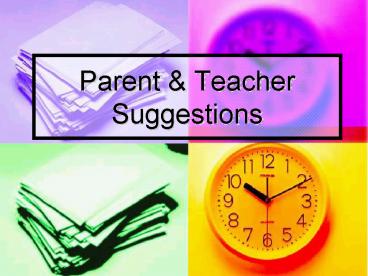Parent PowerPoint PPT Presentation
1 / 11
Title: Parent
1
Parent Teacher Suggestions
2
Mental Retardation
- Use natural supports such as friends, family and
teachers - Self-determination
- Try new things and activities at home, never
underestimate your childs abilities - Search for inclusion programs
- be that recreation or education
3
Learning Disabilities
- Be consistent in establishing household and
homework chores and routines - Practice emergency routines in three steps dont
explain them in words - Use pictures to demonstrate what you want done
- Dont assume that the child is not listening just
because you are getting no verbal or visual
feedback.
4
Attention Deficit (ADD/ADHD)
- Have a child use a computer at home for
assignments or have a library use plan that is
consistent - Practice simple routines that require paying
attention - Provide transitions when going from one thing to
other (5 minute warning when leaving to go out,
story before bedtime) - Provide clear expectations for all activities
- Have a pre-established consequence for misbehavior
5
Emotional/Behavioral Disorder
- Practice distraction techniques for when your
child demonstrates inappropriate behavior - Create choices this makes your child feel in
control - Develop a reward system (stickers, trip to park,
etc.) - Pick one behavior to work on at anytime
- Praise immediately all good behavior
6
Communication Disorder
- Speak naturally to child
- Consult with a speech-language professional
- Consider alternative ways of communicatingdrawing
pictures, use of signals
7
Hearing Impairment
- Consider alternative ways of communicatingdrawing
pictures, use of signals - Provide child with auditory assisted devices such
as hearing aids - Provide child with computer technology for word
prediction, spelling and speaking text - Provide child with other ways of communicating
such as hand held spellers, palm pilots, flashing
lights - Avoid vibrations and excessive noise
8
Visual Impairment
- Create a low-light study area as extremes of
light may cause fatigue and headaches - Provide frequent rest breaks from study
- Encourage the use of Braille
- Become familiar assisted technology such as size
enlargers for computers, talking watches, books
on tape, etc. - Orally, let your child know if you need to move,
leave or end a conversation
9
Orthopedic Impairment
- Locate public adaptive playgrounds
- Use of computers for assignments and
entertainment - Be on a regular maintenance program for all
orthopedic devices and keep spare parts on hand
for quick repairs - Allow more time for your child to complete
activities
10
Giftedness
- Provide opportunities for your child to be a
mentor to a younger child - Encourage your child to participate in
extracurricular activities such as clubs, sports,
band, etc. - Join parent organization for gifted students
- Teach your child about differences in learning so
that your child will be sensitive to others
11
References
- Hallahan, Daniel P, James M. Kauffman. 2003.
Exceptional Learners Introduction to Special
Education, Ninth Edition. - Thomas M. Shea, Anne M. Bauer. 1991. Parents and
Teachers of Children with Exceptionalities A
Handbook for Collaboration. Parents, Families,
and Children with Exceptionalities. 2 29 - Joyanthi, M., Sawyer, V., Nelson, J.S., Bursuck,
W.D., Epstein, M.H. 1995. Recommendations for
homework-communication problems. Remedial and
Special Education, 16 (4), 212-225. - Lynn, L. 1994. Building parent involvement,
National Association of Secondary School
Principals Practitioner, 20 (5), 1-4. - www.as.wyn.edu
- www.kidsource.com/kidsource/monthly/mon.gifted.qa.
011599.html

